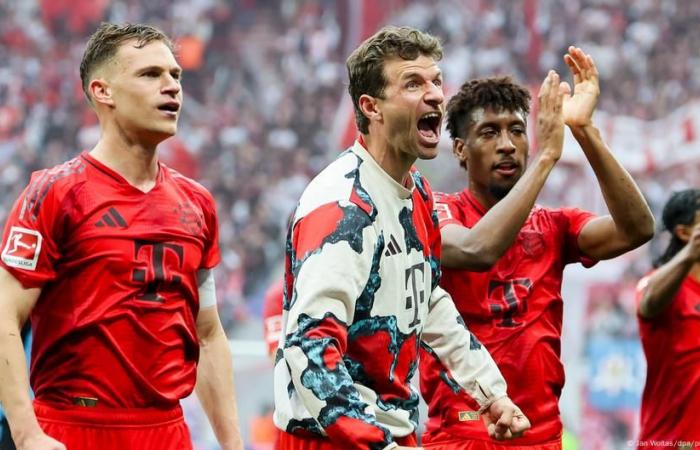After a year of the master break, FC Bayern Munich is back on the throne of German football. It was about twelve months ago that Bayer Leverkusen put the first unbeaten season in Bundesliga history and won the German championship for the first time in the 2023/24 season. A year later, Bayern is enough for Bayern at RB Leipzig and a division of points with SC Freiburg to restore the balance of power in German football on matchday 32.
Bayern Munich is a German champion – and this is a familiar picture for football fans. The German record champion was able to win twelve of the last 13 national titles. The ease of this year’s success can almost forget what great turbulence the club was in the end of last season. First Thomas Tuchel gave up his coaching post, then desired candidates such as Xabi Alonso (Leverkusen) or Ralf Rangnick (Austria) canceled. So how did FC Bayern make it back to the top of German football? And what’s next?
Company as a stabilizer
It is an open secret that Bayern coach Vincent Kompany was not the first choice at the record champion. Company himself was also aware of this. Before taking office at the Munich team, the Belgian had relegated from the Premier League with Burnley and had no experience in looking after a top team. A good start to the Bundesliga was extremely important in order to silence critical voices. Under Kompany, Bayern have moved closer together on the defensive and have found an effective offensive concept. The result: 13 games without defeat to start the Bundesliga season 2024/25.
Perhaps the most impressed the former world-class inner defender away from the square. The job at Bavaria is associated with great internal and external pressure, which company seems to master confidently. Both in dealing with the media and with the players, for example at Leon Goretzka’s dissatisfaction at the beginning of the season, he gives a good picture.
new momentum from the Premier League
Only a few players switch from the English Premier League to the Bundesliga. Bayern Munich, however, broke the pattern with the obligations of Harry Kane (came from Tottenham) last season and Michael Olise (Crystal Palace). Kane’s incredible goal rate is well documented, but it is worthwhile to make it out again: In April he scored his 60th Bundesliga goal in the 60th game, one goal per game on average. In less than two seasons, he has already met against every club in the Bundesliga.
-But a Harry Kane is also not a sole entertainer. He needs support from the wings that he had clearly lacked last season. This problem was solved with the commitment of Michael Olise. Compared to Bavaria’s other foreign strikers, Olise may be a little slower, but he is much more creative and more clever and gives the record champion’s attack a new facet. The numbers speak for themselves: With 13 assists, he has so far contributed most of the templates in the Bundesliga. For comparison: no Bayern player came to more than eleven last season.
Leverkusen weakens
The 2nd matchday already set the course for the rest of the season. Leverkusen played a two-goal lead and lost to RB Leipzig. The eleven of coach Xabi Alonso was dominant, but not determined enough and thus received an early deficit to Bavaria in the championship race, which she could no longer catch up despite the many remaining games. Leverkusen lost only one more time after this defeat (as many defeats as Bayern), but played a third of his games in a tie – too often to defend the championship title.
The outstanding season has made this season look like a step back for the Werkelf. At least Leverkusen has no longer managed to win tight games through individual actions or late goals. It is also feared that the absolute jewel of the team, Florian Wirtz, will leave the club this summer. Should Wirtz decide to switch to Bayern, the 2023/24 season could actually act like a unique slip in the almost eternal dominance of Bavaria Munich.
Bavaria strong in width
Kompany would offer Kompany’s possible commitment even more options in an already well -stocked squad. Bavaria often had to change the defensive due to injuries to Dayot Upamecano, Alphonso Davies and Hiroki. Jamal Musiala’s muscle fiber tear at the beginning of April was also a big loss in the creative offensive area. Kingsley Coman and Serge Gnabry, as well as goalkeeper Manuel, missed new important parts of the season. Kompany then integrated Leon Goretzka back into the team, although it looked as if the German international had no future for Munich before he took office. The partially injury -related rotations in midfield were largely well.
Neuer’s injury in the goal opened the chance to prove himself in the goal of the record champions, which could prove to be an advantage in the goal of the record champions. Neuer will be 40 years old next year. Since Thomas Müller will leave the club after the club World Cup in June and July, Kompany has to prepare for a future without two important long-term supports of the association. But that can still wait. First, FC Bayern celebrates its 34th and Müller the 13th title in the Bundesliga.








